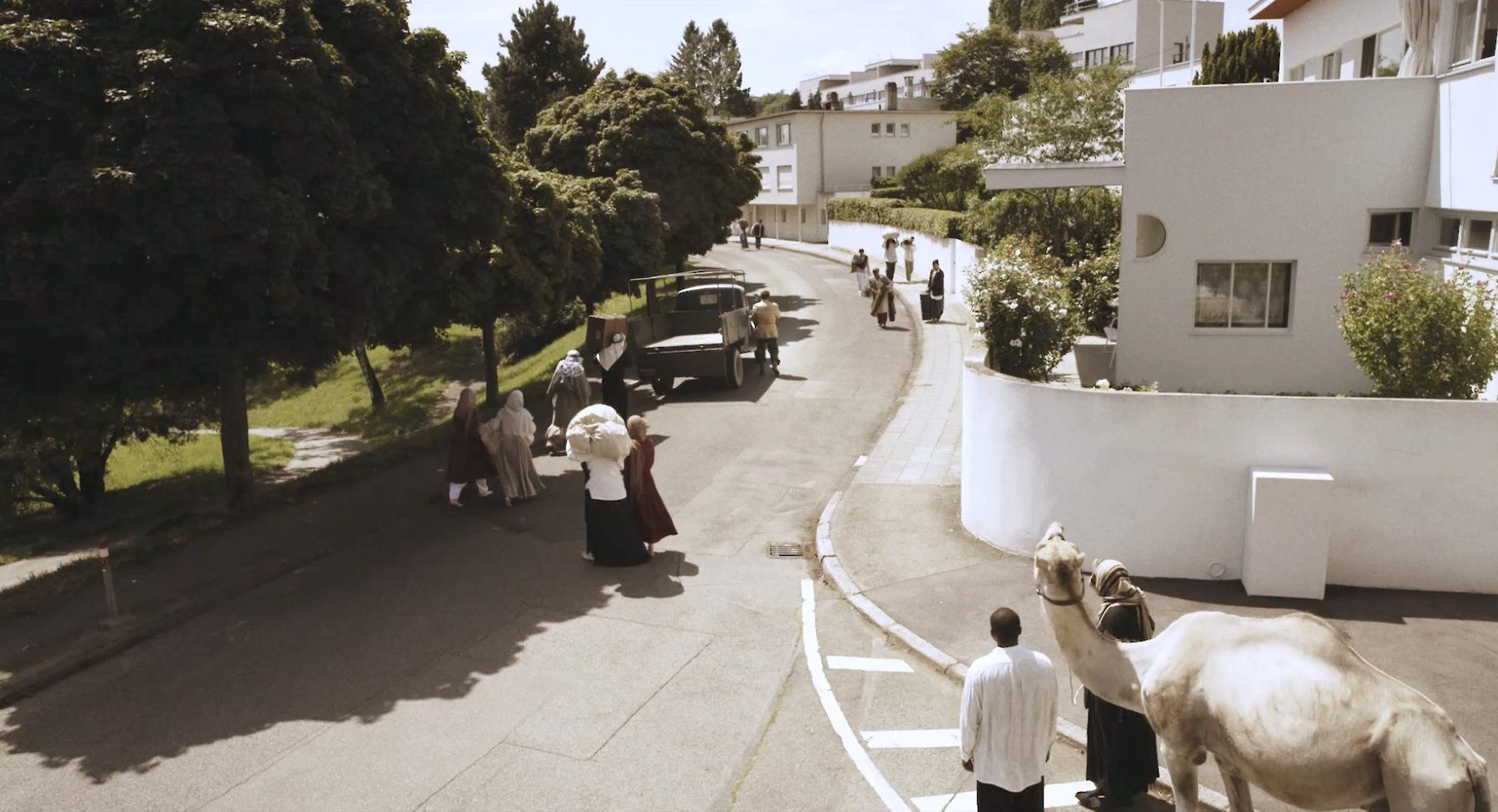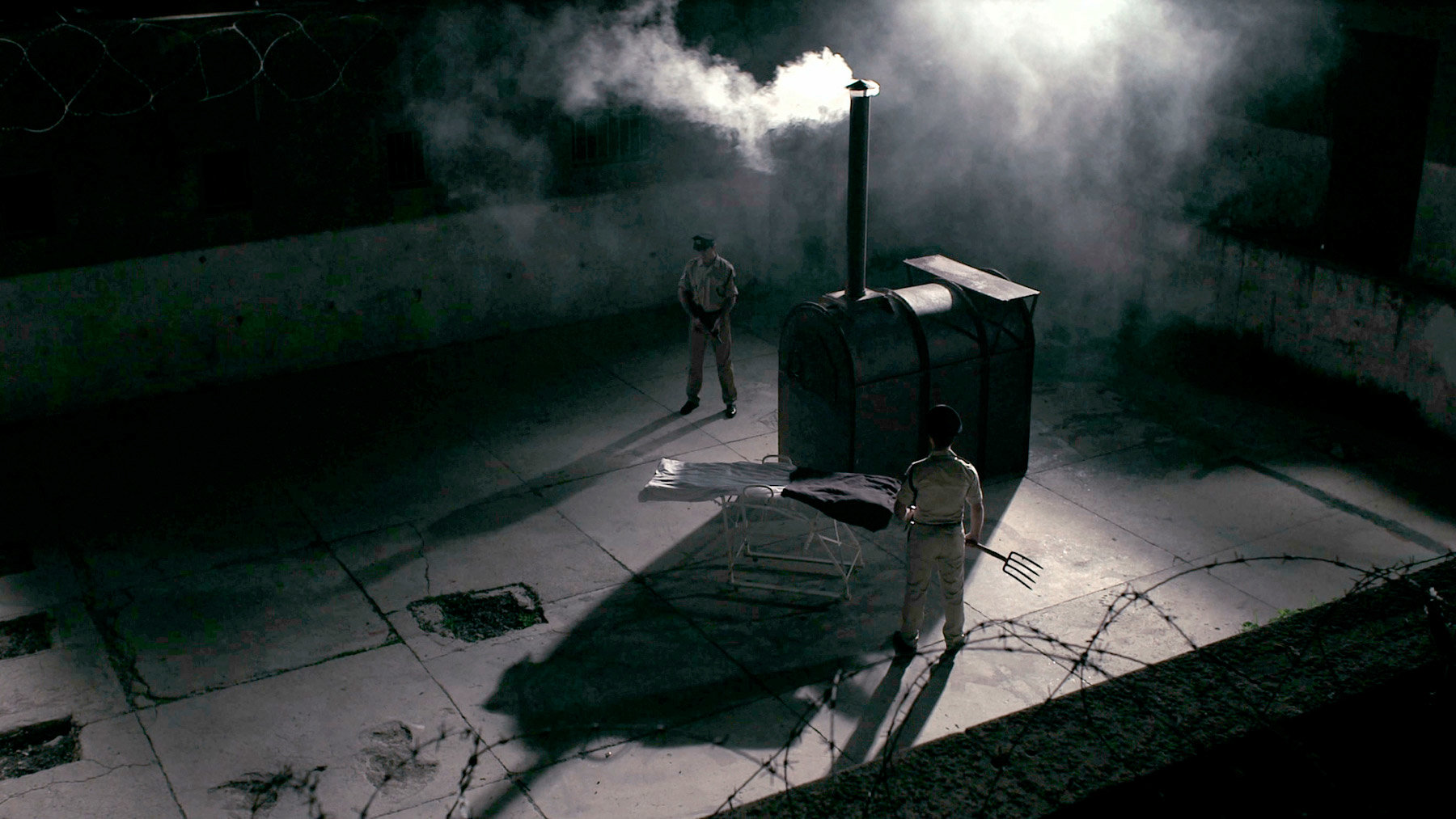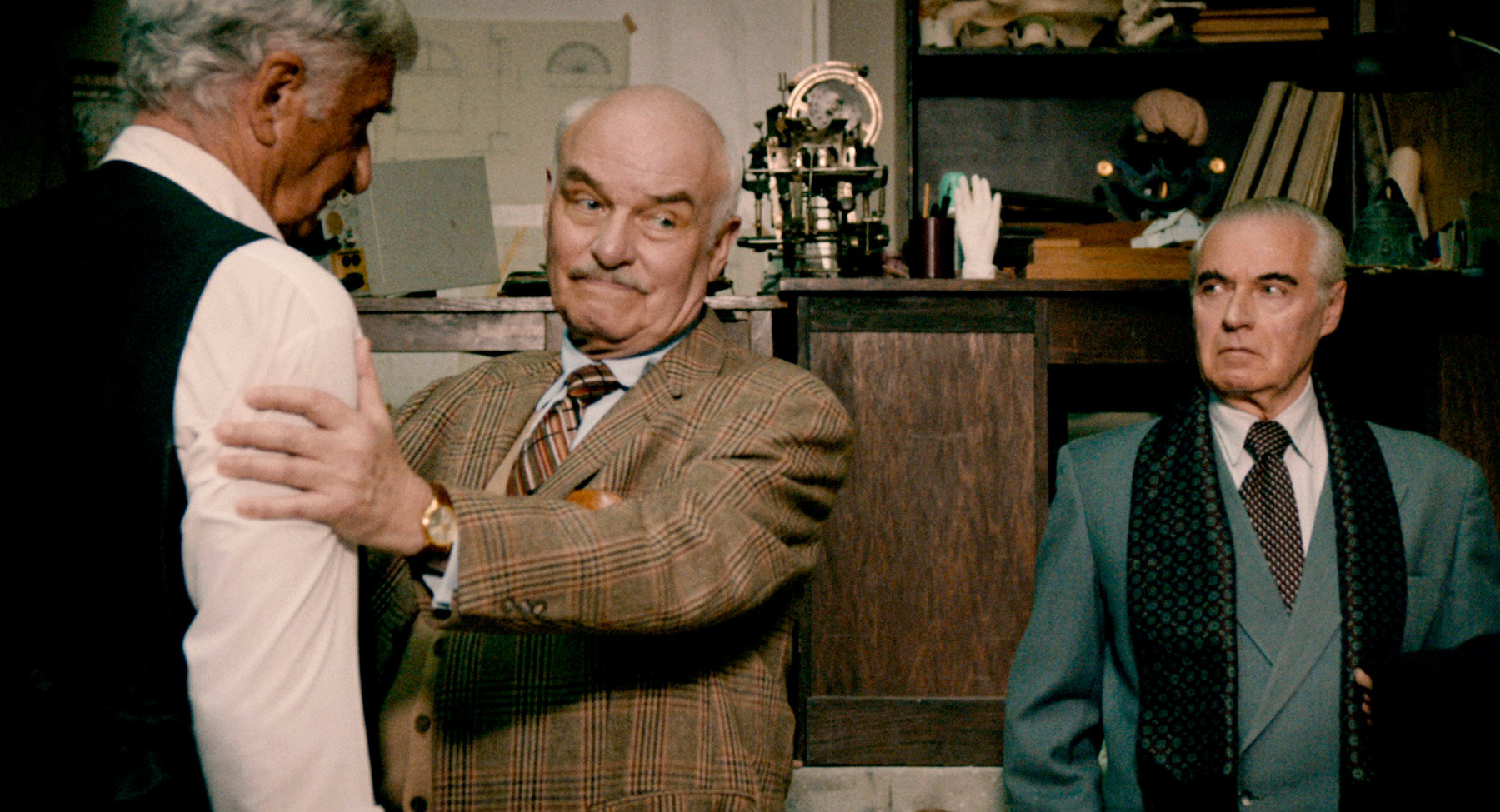Nacht und Nebel, Wie aus der Ferne, White City Dani Gal

Nacht und Nebel
Kamera:
Itay Marom
Produktion:
Jonathan Dowek
Kommissar:
54th Venice Biennale
Wie aus der Ferne
Kamera:
Emre Erkmen
Produktion:
Caroline Kirberg
White City
Kamera:
Itay Marom
Produktion:
Pong Film
- English
- Français
- Deutsch
Dani Gal: Screening and Discussion
Dani Gal’s artistic practice analyses the production of ideology through the representation of specific historical narratives. He works in a variety of media to question the claims of historical knowledge and to reveal and challenge underlying political preconceptions. Gal utilises archival documents to create cinematic re-enactments, which explore the relationship between image, sound and text. His films illuminate national interests behind the construction of historical / national narratives and expose the processes that have constructed collective memory.
Since 2011, Gal utilises cinematic tools to illuminate the undocumented aspects of historical events: of what can be seen as the missing parts of the story. By staging what he terms the “blind spots” of historical knowledge, Gal questions the epistemological gaps between historical “truth” and the interpretation of events from a historical perspective. His research examines how history and memory hover between fact and fiction by navigating between recorded knowledge of events and subjective recollections of these events. The material he gleans points to a keen awareness of the problematic nature of any representation of real events and the process of inclusion and exclusion that goes into re-imagining the past.
This process resulted in three films that feature three historical narratives, each one focussing on the complexities of historical accounts between “victims” and “perpetrators”, mainly in the context of German / Jewish / Arab histories.
Night and Fog
On April 11, 1961, the trial of Adolf Eichmann began. He was tried in an Israeli court and charged for committing crimes against humanity and war crimes. He was convicted and executed by hanging on May 31, 1962. On a night, between the 31st of May and the 1st of June 1962 shortly after the execution and the cremation of the body, a group of police officers sailed on a boat 6 miles off the shores of Jaffa port. Their mission was to scatter Eichmann’s ashes into the international waters of the Mediterranean Sea. The purpose of the highly secret mission was to ensure that there could be no future memorial and that no nation would serve as his final resting place. Based on an interview Dani Gal made with Michael Goldman, a Holocaust survivor who was one of the policemen on the boat, the film re-enacts the scene of the group of policemen sailing on a dark foggy night with Eichmann’s ashes in a jug of milk.
As from Afar
A fictionalised account of Wiesenthal and Speer’s meetings, that uses dialogue based on their letters. Speer first wrote to Wiesenthal in 1974 after his release from prison in an effort to accept some responsibility for his war crimes. His public admission of his moral misconduct impressed Wiesenthal and they began a correspondence that lasted until the early 1980s. Despite their profoundly contrasting personal histories, they shared common interests—both were trained architects and successful authors. They pursued their unlikely friendship despite controversy and occasionally visited each other. Gal takes this strange relationship as a starting point for a meditation on how historical events are recalled, recorded, and distorted.
White City
On August 16, 1933 Arthur Ruppin wrote the following entry in his diary:
“Through Dr. Georg Landauer I travelled to Jena on August 3rd to meet Prof. Hans F.K. Günther, the founder of National-Socialist race theory. The conversation lasted two hours. Günther was most congenial but refused to accept credit for coining the Aryan-concept, and agreed with me that the Jews are not inferior but different, and that the Jewish Question has to be solved justly.”
The film revolves around the complex character of Arthur Ruppin (1876-1943), one of the founders of the Zionist Settlement who promoted coexistence with the Palestinians before the establishment of the state of Israel. Ruppin was also an enthusiastic researcher of the science of race, which explains his motive in paying a visit to Hans F.K. Günther (1891-1968), the German race researcher and eugenicist who later became a major influence on National Socialist racial thought. The film shows Ruppin as he visits the Weissenhof Estate, a neighborhood in Stuttgart famous for its modern architecture style, and experiences flashbacks which reflect his views. The monologues and dialogues within this film are based mainly on Ruppin’s diaries.
Une soirée avec Dani Gal: Film et discussion
Dani Gal s’intéresse aux faits « oubliés » de l’histoire et réalise des reconstitutions filmées, à l’instar de cette trilogie : Dans Nacht und Nebel (2011), l’artiste met en scène le récit d’un survivant de l’holocauste et policier israélien, Michael Goldman, qui a participé à la mission secrète de la mise à la mer des cendres d’Adolf Eichmann, en 1962.
Wie aus der Ferne (2013) s’inspire de la correspondance, pendant les années 1970, entre Simon Wiesenthal, survivant autrichien de la Shoah, et Albert Speer, architecte en chef et ministre de l’Armement et de la Production de guerre du Parti national-socialiste durant le IIIème Reich. Face à ce dialogue et cette amitié improbable, des citations de textes du Cahier brun de Wittgenstein viennent ponctuer et interroger la construction des images du passé et les souvenirs individuels. Basé sur le journal d’Arthur Ruppin, l’un des fondateurs de l’implantation sioniste en Palestine avant la création d’Israël, le nouveau film White City (2018) rappelle sa rencontre, en 1933, avec Hans F. K. Günther, anthropologue et futur « raciologue » du IIIème Reich.
Nacht und Nebel, 2011. Vidéo HD, 23 min, anglais
Wie aus der Ferne , 2013. Vidéo HD, 27 min, allemand avec sous-titres anglais
White City , 2018. Vidéo HD, 26 min, allemand avec sous-titres anglais
(Texte: Centre Pompidou, Paris)
Ein Abend mit Dani Gal: Film und Diskussion
Nacht und Nebel, 2011 / 23 Min. Englisch
Wie aus der Ferne 2013 / 27 Min. Deutsch mit engl. UT
White City 2018 / 26 Min. Deutsch mit engl. UT
NACHT UND NEBEL
Die Nachstellung der Nacht, in der Adolf Eichmann von israelischen Polizisten hingerichtet und seine Asche ins Meer gestreut wurde. Der Film basiert auf einem Interview mit Michael Goldman, einem Holocaust-Überlebenden und Polizei-Offizier, der die Hinrichtung durchgeführt hat.
WIE AUS DER FERNE
Die komplexe Freundschaft zwischen Simon Wiesenthal, dem „Nazi-Jäger“, und Albert Speer, dem leitenden Architekten der Nazis, wird durch die Folie eines kurzen Textes von Ludwig Wittgenstein über Erinnerungsbilder inszeniert. Die Dialoge basieren auf den Briefen zwischen Wiesenthal und Speer.
WHITE CITY
Der Deutsche Zionist Soziologe und Eugeniker Arthur Ruppin besucht die Weißenhofsiedlung Stuttgart. In Rückblicken seines Besuchs beim NS-Rassentheoretiker Hans F.K. Günther verweben sich ihre Theorien in eine deliriöse Fantasie: Araber und Kamele ziehen durch die an das Tel Aviv der 1930er Jahre erinnernde Bauhaus-Siedlung.
Part of Blood Mountain Projects’ 2019 artist-in-residence
Discussion chaired by Prof. Noit Banai, art historian and critic
Event organised in cooperation with:
Blood Mountains Projects
The artist’s residency with Blood Mountain Projects is produced in association with:
Wiener Wiesenthal Institut 
The artist’s residency with Blood Mountain Projects is supported by:
Bundeskanzleramt
ZukunftsFonds der Republik Österreich

